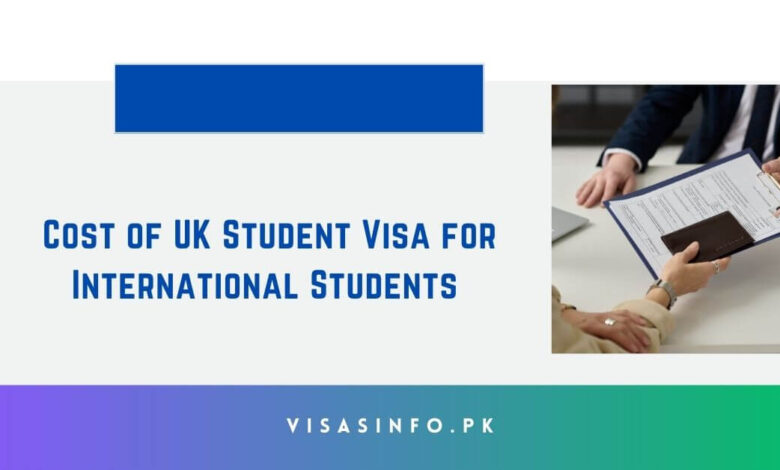Cost of UK Student Visa for International Students in 2024

The cost of an international student’s student visa to study in the United Kingdom. Are you planning to apply for a student visa to the United Kingdom? Are you cognizant of the expenses that accompany this? Read this article to obtain the specifics.
An official cost of £490 is required for both in-country and entry clearance applications for a student visa. Alternatively, you may expedite the processing of your application by utilizing the priority services that are available in specific countries for an additional £500.
Furthermore, applicants are required to pay a healthcare premium to conveniently access the National Health Service (NHS) while in the UK. The annual healthcare surcharge for students is £776 as of February 2024.
Also, we recommend that you verify the most recent rates before submitting your application, as they are subject to change. The candidates must demonstrate that they have sufficient funds to cover the cost of living in the UK and the tuition for at least the first year of the study, in addition to the costs owed to the Home Office.
The Home Office determines these adequate quantities by employing a predetermined formula that is contingent upon the city in the country where you will be residing.
In summary, we recommend that you meticulously prepare your application before submitting it to minimize the likelihood of rejection. Put differently, it is crucial to bear in mind that not all application fees are refundable, in addition to the time and expenses associated with applying for a UK student visa.
UK Student Visa Requirements, Eligibility Criteria, and Application Steps
International students who have been accepted by British educational institutions are required to register for a UK Student Visa before the commencement of their courses. Students from the EU and EEA must also apply for a visa to study in the UK.
Check Also: UK Visa Options For Foreigners Without a Joining Letter
Changes made to the UK Student Visa
The British government has reportedly stated that the number of learners who can obtain a visa under the new Student Visa program is infinite. The following are some of the most significant changes to the UK Student Visa that have been implemented:
- The Student Route, which is intended for students over the age of 18, and the Child Student Route, which is intended for students aged 4-17, are initially distinguished.
- To visit the United Kingdom, citizens of the EU/EEA must also apply for a visa.
- Additionally, you are permitted to apply for a student visa up to six months before the commencement of classes.
- Additionally, eligibility for a visa is determined by a point-based system, with a minimum of 70 points.
- Finally, post-graduate visas are available to graduates of British educational institutions.
Who is Eligible for a UK Student Visa?
The new UK Student Visa is available to nationals of the EU, EEA, and non-EEA countries who have amassed 70 points under the point-based immigration system. The system assesses whether you meet the requirements for studying in the United Kingdom, which include:
- The most critical aspect is being accepted into a reputable institution.
- Furthermore, possess the financial capacity to cover the cost of your accommodation.
- Finally, proficiency in the English language is essential.
UK Student Visa Requirements
If you are accepted into one of the following programs, you may be eligible to apply for a student visa to the United Kingdom:
- Initially, an apprenticeship, full-time undergraduate study, or the initial two years of a bachelor’s degree.
- Additionally, a program that is completed on a full-time basis and results in a degree or a certificate that is equivalent to a degree.
- Furthermore, a degree-level course that is pursued on the side and exceeds RQF 7
- Additionally, a postgraduate program that is accredited by physicians or dentists.
- Finally, an English language course is included in the Common European Model of Reference for Languages.
How to Apply for a UK Student Visa
- Before entering a Visa Application Office in your country to submit your biometrics, you must initiate the online application on the UK government’s website.
- After submitting an online application, you will request guidance on how to proceed, depending on your country of residence.
- Parental or guardian approval will be required for minor student visa applicants.
Can one switch to a UK Student Visa?
If you are currently in the United Kingdom and your current visa does not come under one of the following categories, you may convert it to a student visa:
- Initially, a visitation authorization is required.
- Subsequently, a transitory student visa
- Thirdly, a student visa for a parent of a child.
- Fourthly, a visa for transient employment
- Finally, a visa for a domestic laborer employed in a private residence.
Benefits of Cost of a UK Student Visa
- Access to World-Class Education: The United Kingdom is home to some of the world’s most prestigious universities and educational institutions. Access to cutting-edge research facilities, renowned faculty, and high-quality education can be obtained by obtaining a Student Visa, which can improve your academic and professional prospects.
- Post-Study Employment Opportunities: The United Kingdom provides a Graduate Visa that enables international students to remain and work in the country for a maximum of two years (three years for doctoral students) following the completion of their studies. This presents an opportunity to acquire valuable work experience and potentially facilitate a transition to other visa categories, such as the Skilled Worker Visa.
- Global Recognition of Qualifications: Degrees and qualifications obtained from UK institutions are highly regarded on a global scale. The investment in a Student Visa is justified by the global recognition and respect that UK qualifications command, which can open doors to job opportunities and further studies on a global scale.
- Opportunities for Culture and Networking: Studying in the United Kingdom offers a diverse cultural experience and the opportunity to establish a global network of professional contacts and acquaintances. This has the potential to be invaluable in terms of personal growth and prospective career opportunities.
- Part-Time Work Rights: The Student Visa permits you to work part-time during your studies, with a maximum of 20 hours per week during term time and full-time during school holidays. This can provide financial assistance while acquiring work experience, thereby helping to offset the cost of living and tuition fees.
- Healthcare Access: The Immigration Health Surcharge (IHS) is a component of the Student Visa application that provides you with access to the National Health Service (NHS) of the United Kingdom. This guarantees that you will have access to healthcare services during your stay, which could result in a reduction in medical expenses and a sense of tranquility.
- Pathway to Permanent Residency: The Student Visa can serve as a preliminary step toward permanent residency for students who intend to remain in the United Kingdom following the completion of their studies. Eventually, you may be eligible to apply for Indefinite Leave to Remain (ILR) after acquiring work experience on the Graduate Visa or transitioning to another visa category.
- Dependent Benefits: If you are pursuing a postgraduate degree, you are permitted to transport your dependents, including your spouse/partner and children. In the United Kingdom, your dependents are also permitted to work full-time, which can provide financial support for your family and provide additional stability during your academic pursuits.
- Cultural and Recreational Experiences: As a student in the United Kingdom, you have the chance to immerse yourself in the country’s vibrant cities, diverse culture, and rich history. Additionally, the acquisition of a Student Visa enables you to immerse yourself in a nation that is renowned for its cultural heritage and high quality of life.
- Scholarships and Funding: Numerous universities in the United Kingdom provide scholarships, grants, and bursaries that are specifically designed for international students. These can assist in decreasing the overall cost of studying in the United Kingdom, thereby rendering the investment in a Student Visa more affordable.
Frequently Asked Questions:
-
How much money is required for a UK student visa?
Money to support yourself (‘financial requirement’)
How much money you need depends on where you will be studying. You’ll need either: Courses in London cost £1,334 per month (for up to 9 months). Courses outside of London cost £1,023 per month (for up to 9 months). -
How much does it cost for an international student to study in the UK?
How much does it cost to complete a study in the UK for international students? The tuition fees to complete study at some universities are around £25,000 to £35,000. Fees at mid-range universities range from £14,000 to £18,000. Living and eating requires eight hundred to a thousand pounds per month.
-
What is the age limit for a student visa in the UK?
What is the age limit for a UK study visa? No, there is no upper age limit to apply for a UK study visa. However, to secure a seat on a course and apply for a Tier 4 (general) student visa, you must be 16 years old or older.



